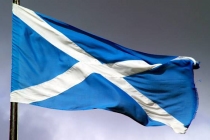Consistent majority support for Scottish independence spells end for the union with England

At last the end is in sight for the three-century-old Scottish union with England, a union that has resulted in the domination of Scotland by its larger neighbour. A series of opinion polls, conducted months apart, have shown a consistent rise in support for Scottish independence. At the same time the Scottish National Party (SNP) remains well ahead of the Scottish pro-union political parties. Suggesting an outright majority for the SNP in next year's elections to the Scottish Parliament (Scottish Gaelic: Pàrlamaid na h-Alba), with a predicted 57 per cent share of constituency voting.
There is now clear and a widely felt unhappiness in Scotland with the clear failings of the undemocratic nature of the United Kingdom (UK) parliament. The UK parliament has 1,458 members, of which 650 are elected and 808 unelected! The Scottish parliament, in contrast, is a democratically elected body comprising 129 members. Yet the English dominated UK parliament makes decisions that can overrule the Scottish parliament on virtually anything. There is also always the threat that the UK parliament in Westminster can undermine and destroy what powers the Scottish parliament have at any time.
It is very clear that as an independent Scottish state, the government will be one elected by Scottish voters. The result will be a Scotland able to take responsibility and get the opportunity to make changes that can benefit the Scottish people. The present UK government is losing the argument against Scottish independence and this is reflected in the shifting opinion polls. Something that has caused panic within Scottish supporters of continued union and an air of desperation in the UK government as it flounders in trying to think of ways to shore up the union. At the moment the UK government is resorting to the position of just refusing the Scottish people a right to a referendum on independence. This refusal by a hugely unpopular UK government will only further alienate Scottish people. It is a position that is unsustainable in the long run, will increase the level of Scottish grievance and make independence more likely.
The latest poll suggests that 55% of Scots would back independence in a new referendum. It reflects a total reversal of the 2014 referendum which ended 55-45 in favour of staying in the UK. As SNP deputy leader Keith Brown said: "With consecutive polls putting support for independence above 50%, it's clear this is not a trend but the established position of the Scottish electorate." However, although there is a pattern suggesting that the writing is very definitely on the wall for the union. It is also the case that a desperate UK government will resort to desperate measures to oppose Scotland's independence. In doing so we are likely to see a vicious campaign of misinformation and outright anti-Scottish propaganda by the English dominated British media in coming months.






